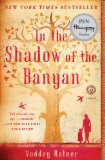Summary | Excerpt | Reviews | Beyond the book | Read-Alikes | Genres & Themes | Author Bio

Nominated for the Man Asian Literary Prize ("The Booker of Asia")
"A sublime tale told by a master storyteller, steeped in the lore of old. Ferrer's conjuring of romantic Indochine is a journey that lures, stirring up ghosts in a wild phantasmagoria, reckoning with forces both entwined and eternal." - Angela Kan, Travel Host & Writer, The Discovery Channel
Jacquie Mouhot and Paaku the Lotus-Born are divided by six centuries but linked by a common curse. In medieval Cambodia, Paaku is an orphan whose community believes he may be a reluctant incarnation of a god, causing sectarian turmoil for the kingdom's leaders. Meanwhile, in 1921, Jacquie follows the footsteps of her grandfather, a famous explorer, to Indochina, where she becomes immersed in the tragedy of Paaku's history: a story simultaneously unfolding in the intertwined present and past, a story in which she still has a vital role to play.
Overall, The Last Gods of Indochine, which was nominated for The Man Asian Literary Prize, is a compelling and fascinating read. It succeeds in bringing the ancient Kingdom alive and allows us to imagine something of the society, superstitions and power structures inherent within it, which may also have contributed to bringing about its mysterious collapse. It left me wanting to, not just know more about the history of the Kingdom, but visit its stunning monuments - as long as there isn't really a curse!..continued
Full Review
(574 words)
This review is available to non-members for a limited time. For full access,
become a member today.
(Reviewed by Claire McAlpine).
 The Khmer Empire was a powerful state in South-East Asia that existed between 802-1431 AD. At the height of its power, it covered modern-day Cambodia, Thailand, Laos, and southern Vietnam. Made up of 90 provinces, its capital Angkor was, at one point, a thriving city of over one million people. The empire was founded upon extensive networks of agricultural rice farming communities managed by the Kingdom.
The Khmer Empire was a powerful state in South-East Asia that existed between 802-1431 AD. At the height of its power, it covered modern-day Cambodia, Thailand, Laos, and southern Vietnam. Made up of 90 provinces, its capital Angkor was, at one point, a thriving city of over one million people. The empire was founded upon extensive networks of agricultural rice farming communities managed by the Kingdom.
Much of the history of Khmer society is known through bas-relief carvings of the Angkor temples (that are studied by the character and real life art historian Victor Goloubew in Samuel Ferrer's The Last Gods of Indochine) and the writings of the visiting 13th century Chinese diplomat Zhou Daguan. The bas-reliefs describe everyday ...
This "beyond the book" feature is available to non-members for a limited time. Join today for full access.

If you liked The Last Gods of Indochine, try these:

by Vaddey Ratner
Published 2013
Displaying the author's extraordinary gift for language, In the Shadow of the Banyan is testament to the transcendent power of narrative and a brilliantly wrought tale of human resilience.

by Anita Amirrezvani
Published 2008
In 17th-century Persia, a young woman and her mother find themselves alone and without a dowry. Forced into a secret marriage to a wealthy man, the young woman is faced with a daunting decision: forsake her own dignity, or risk everything she has in an effort to create a new life.
Fanaticism consists in redoubling your effort when you have forgotten your aim
Click Here to find out who said this, as well as discovering other famous literary quotes!